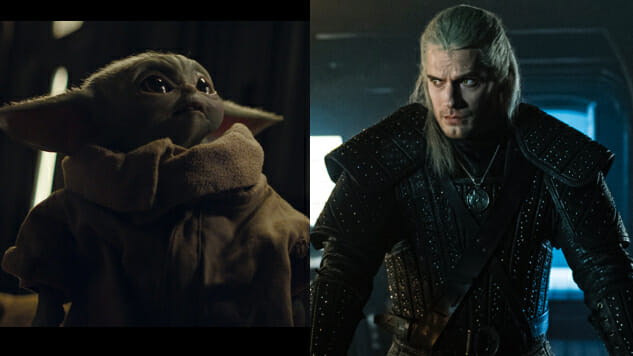What The Mandalorian and The Witcher Have in Common (Besides Pure Joy)
Both series are late-season MVPs and more similar than you may realize.
Photo Courtesy of Disney and Netflix
2019 was a good year for TV fantasy, although it came late. Game of Thrones ended in May, and despite its truly awful final bow, the show as a whole did generally warm audiences up to the idea of fantasy as more than niche entertainment—even though it only really dabbled in high fantasy (the magical elements of that world were all but stripped away, aside from zombies and dragons). We were then blessed with Netflix’s The Dark Crystal: Age of Resistance in August (a true fantasy series not just set in a magical realm but populated with puppets!) But beyond that expansion of a storied property, there were still two more highly-anticipated franchise fantasy series to come (one of which also prominently featured a puppet): Disney+’s The Mandalorian, and Netflix’s The Witcher. And both have been a rollicking good time.
Now, there has long been a debate in the sci-fi and fantasy worlds about whether or not sci-fi is fantasy or if fantasy can be sci-fi, but suffice to say they are both genres that have a lot of overlap. And when it comes to The Mandalorian and The Witcher specifically, there’s more overlap than you may at first realize—beyond the fact that they are late-season epics based on established works debuting on streaming platforms. Firstly, both have fun with well-worn genres, be they westerns or classic hero stories, by breathing new life and new form into them. Witcher, taken seriously, is a mess. But if you allow yourself to just buy into its insanity, you get a show that is both an R-rated adventure and an almost satirical tale of a man, his horse, and his bard. Similarly, The Mandalorian is ostensibly about a bounty hunter (much like The Witcher), but in actuality it’s about a single dad protecting his alien son and making money to get by through a series of quests.
That quest aspect also feeds into the fact that both series feel like videogames. The Witcher is, of course, also an extremely popular videogame series, but it’s easy to watch both shows and note that a plot feels like a fetch quest versus a main quest. The fact that both Mando and Witcher are commonly referred to by their professions is another classic RPG aspect, where we don’t know much about our protagonist when we start since they act as an avatar for our own place in the story.
That avatar aspect is not exactly true in either of these series, but it is true that neither show explains almost anything as we go along. The internet has come to call Baby Yoda that name because it’s a creature that looks like another Star Wars creature whose species has never been named. Mando doesn’t even have a name, and we’ve never seen his face (until the finale). The Witcher spends almost an entire episode with everyone talking about “The Law of Surprise” and its implications before explaining what, in fact, that Law of Surprise even is. There is also no hard sense of time or place in either series, and Witcher is particularly mind-boggling when it comes to timelines. And while The Mandalorian leans into its weekly episode rollout with short chapters that each take on a new mini-story, The Witcher will sometimes make you feel like you’ve missed entire episodes in between actual episodes because of how much lore or how many names it tosses out without context.
-

-

-

-

-

-

-

-

-

-

-

-

-

-

-

-

-

-

-

-

-

-

-

-

-

-

-

-

-

-

-

-

-

-

-

-

-

-

-

-








































